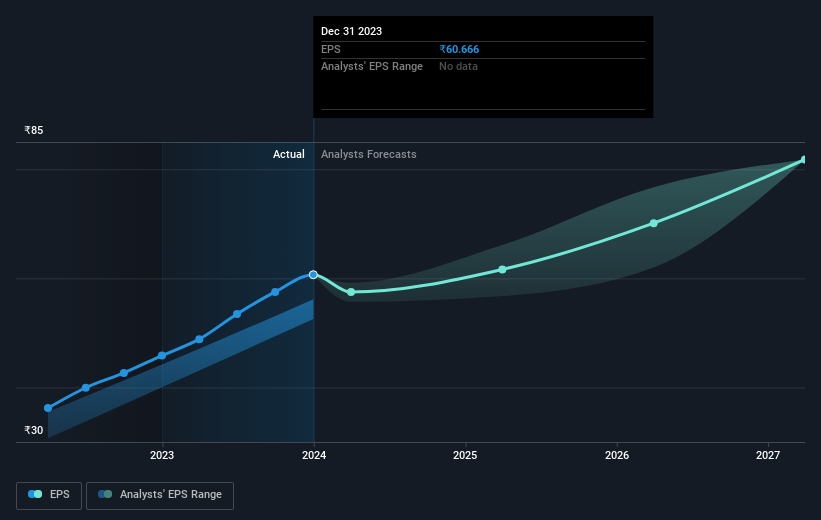Stock Analysis
ICICI Bank (NSE:ICICIBANK) delivers shareholders impressive 23% CAGR over 5 years, surging 5.5% in the last week alone

When you buy a stock there is always a possibility that it could drop 100%. But on a lighter note, a good company can see its share price rise well over 100%. One great example is ICICI Bank Limited (NSE:ICICIBANK) which saw its share price drive 182% higher over five years. On top of that, the share price is up 10% in about a quarter. But this move may well have been assisted by the reasonably buoyant market (up 7.8% in 90 days).
Since the stock has added ₹410b to its market cap in the past week alone, let's see if underlying performance has been driving long-term returns.
See our latest analysis for ICICI Bank
To quote Buffett, 'Ships will sail around the world but the Flat Earth Society will flourish. There will continue to be wide discrepancies between price and value in the marketplace...' By comparing earnings per share (EPS) and share price changes over time, we can get a feel for how investor attitudes to a company have morphed over time.
During the five years of share price growth, ICICI Bank moved from a loss to profitability. That kind of transition can be an inflection point that justifies a strong share price gain, just as we have seen here.
The graphic below depicts how EPS has changed over time (unveil the exact values by clicking on the image).

It is of course excellent to see how ICICI Bank has grown profits over the years, but the future is more important for shareholders. Take a more thorough look at ICICI Bank's financial health with this free report on its balance sheet.
What About Dividends?
As well as measuring the share price return, investors should also consider the total shareholder return (TSR). The TSR is a return calculation that accounts for the value of cash dividends (assuming that any dividend received was reinvested) and the calculated value of any discounted capital raisings and spin-offs. So for companies that pay a generous dividend, the TSR is often a lot higher than the share price return. We note that for ICICI Bank the TSR over the last 5 years was 187%, which is better than the share price return mentioned above. This is largely a result of its dividend payments!
A Different Perspective
ICICI Bank provided a TSR of 22% over the last twelve months. But that was short of the market average. On the bright side, the longer term returns (running at about 23% a year, over half a decade) look better. Maybe the share price is just taking a breather while the business executes on its growth strategy. I find it very interesting to look at share price over the long term as a proxy for business performance. But to truly gain insight, we need to consider other information, too. For instance, we've identified 1 warning sign for ICICI Bank that you should be aware of.
We will like ICICI Bank better if we see some big insider buys. While we wait, check out this free list of growing companies with considerable, recent, insider buying.
Please note, the market returns quoted in this article reflect the market weighted average returns of stocks that currently trade on Indian exchanges.
Valuation is complex, but we're helping make it simple.
Find out whether ICICI Bank is potentially over or undervalued by checking out our comprehensive analysis, which includes fair value estimates, risks and warnings, dividends, insider transactions and financial health.
View the Free AnalysisHave feedback on this article? Concerned about the content? Get in touch with us directly. Alternatively, email editorial-team (at) simplywallst.com.
This article by Simply Wall St is general in nature. We provide commentary based on historical data and analyst forecasts only using an unbiased methodology and our articles are not intended to be financial advice. It does not constitute a recommendation to buy or sell any stock, and does not take account of your objectives, or your financial situation. We aim to bring you long-term focused analysis driven by fundamental data. Note that our analysis may not factor in the latest price-sensitive company announcements or qualitative material. Simply Wall St has no position in any stocks mentioned.
About NSEI:ICICIBANK
ICICI Bank
ICICI Bank Limited provides various banking products and services in India and internationally.
Adequate balance sheet average dividend payer.

